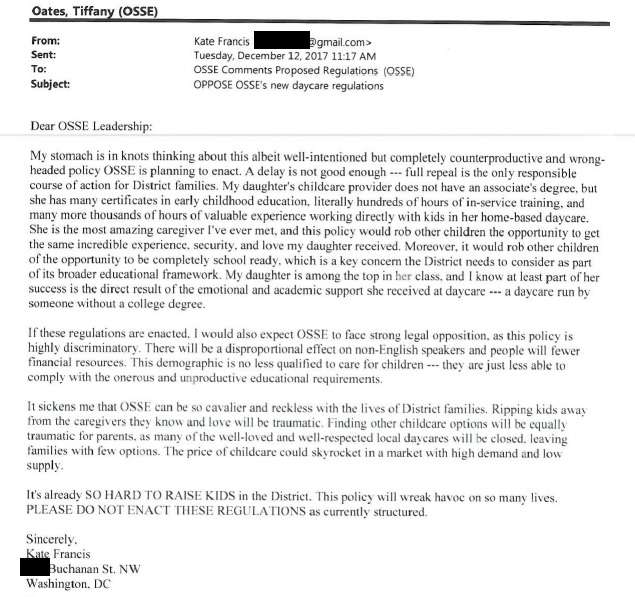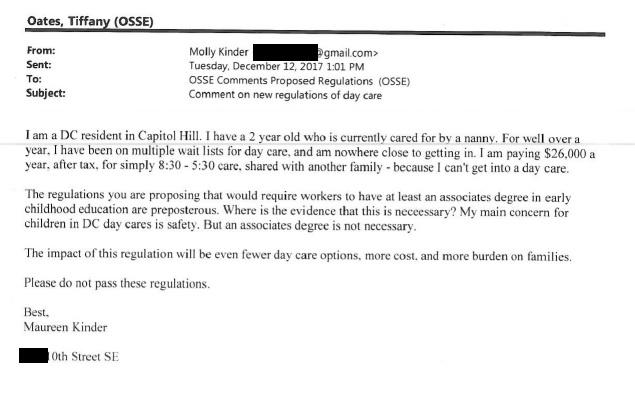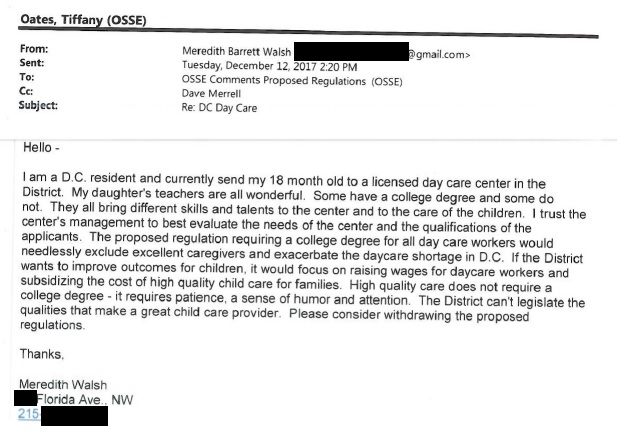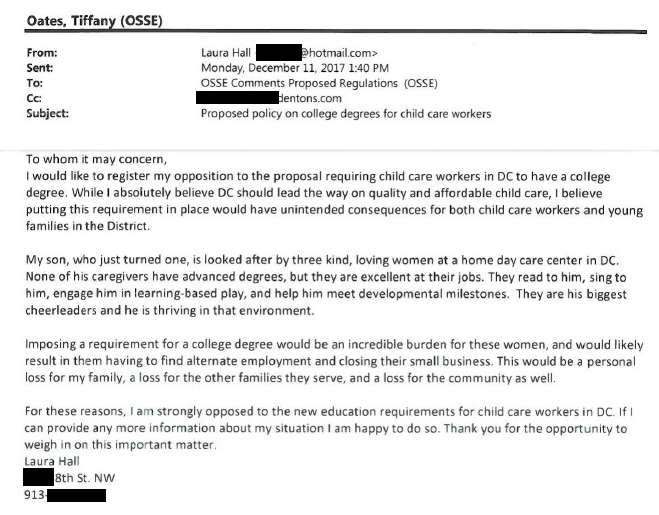Everybody Hates DC's Proposal Forcing Daycare Workers to Get College Degrees
And with good reason, since it would drive up costs and limit access to child care by requiring daycare workers to get a college degree.
"Outrageous and tone deaf." "Madness." "Completely counterproductive and wrong-headed."
And that's just within the first few of more than 400 pages of comments submitted by residents of Washington, D.C., a city where child care costs are already some of the highest in the country, in response to an onerous new licensing requirement for daycare workers. The Office of the State Superintendent for Education (OSSE), which regulates daycares and early childhood education programs in the nation's capital, last year passed a rule requiring all daycare workers to have a college degree by 2020.
The OSSE is currently considering postponing the implementation of the new requirement (a decision is expected in early 2018; the city council will have 30 days to reveiw the OSSE's decision).
Reason obtained more than 400 pages of public comments submitted to the Office of the State Superintendent of Education (OSSE), including about 50 pages sent directly to the OSSE by concerned parents, along with dozens of pages submitted by various organizations on both sides of the issue, and hundreds of comments collected by the Institute for Justice, a libertarian law firm opposed to the mandate, via a website set-up to inform D.C. residents of the consequences of the policy.
A vast majority of the comments call for scrapping the mandate entirely, while others favor the OSSE's extension proposal.

"A delay is not good enough—full repeal is the only responsible course of action for District families," Kate Francis, a resident of the city's northwest quadrant, writes. "It sickens me that OSSE can be so cavalier and reckless with the lives of District families. Ripping kids away from the caregivers they know and love will be traumatic."
The policy is also highly discriminatory because non-English speakers and low income individuals will have a harder time getting the necessary college diploma, Francis writes. That doesn't make them less qualified to care for children—just less able to comply with "onerous and unproductive" requirements.
After meeting with child care workers and parents, Ashley Carter, an at-large representative to the State Board of Education of the District of Columbia, believes the mandate should be fully repealed.
"There is a large consensus among workers who say it places a burden on them that is both unfair and unnecessary," Carter wrote to OSSE. "Additionally, many parents believe this will price them out of quality childcare where they live and work, and take away their choice of which provider they want to care for their child."

The OSSE said it wanted daycare providers to have skills rivaling elementary school teachers. But the mandate's supporters haven't identified any specific deficiencies in the current child care workforce. Instead, they focus on the supposed benefits of having trained early childhood educators working with children as young as 18 months.
"This is a real opportunity to build the profession and set our young children on a positive trajectory for learning and development," Elizabeth Groginsky, the district's assistant superintendent of early learning, told The Washington Post in March.
One of the only comments in favor of the new requirement came from Beverly Robertson Jackson, a member of the board of the DC Early Learning Collaborative. She supports extending the timeline for daycare workers to comply with the mandate, but said the mandate itself was part of an attempt "to increase the quality of infant and toddler and all birth-to-five early learning services for families."
Requiring daycare workers to have a college degree doesn't necessarily mean the quality of child care in DC will increase. Research by Diana Thomas and Devon Gorry, economists at Creighton University and Utah State University, respectively, shows that daycare regulations intended to improve quality often focus on easily observable measures—like mandatory degrees or certifications—that do not necessarily affect the quality of care.
Instead, Thomas and Gorry conclude, all they do is increase the cost of care.
The average cost of child care in D.C. is more than $22,600 annually, the highest of any metropolitan area in the country, according to the Economic Policy Institute, a think tank focused on policies affecting consumer costs. That's likely to go up if the mandate goes into effect. The required associates' degree costs about $6,000 on average for a two-year program, according to The College Board.
The mandate would likely force many current daycare workers out of the field, or would require them to spend time and money just to keep the job they are already doing.

Lyndsey Fifeld said she and her partner did the math and realized that it would be more affordable for her to quit a full-time job and stay home with her kids (along with providing childcare for someone else), rather than continuing to work and pay for child care.
"Yes, that's right," she told the OSSE. "I could get work providing childcare—taking the job away from another perfectly qualified, younger DC resident who needs the work experience and paycheck and putting my career on ice."
Parents who left comments on the proposed OSSE policy don't seem too concerned with the current quality of care in the city's daycares and preschools.

"My son, who just turned one, is looked after by three kind, loving women at a home day care center in DC. None of his caregivers have advanced degrees, but they are excellent at their jobs, wrote Laura Hall, a resident of 8th Street NW, in one of the comments. "Imposing a requirement for a college degree would be an incredible burden for these women, and would likely result in them having to find alternate employment and closing their small business."
And if parents want to seek-out daycare programs staffed with college-educated workers, they are free to do that now.
"Most DC parents are savvy consumers and most DC center compete fiercely for business," wrote Kenan Fikri in one emailed comment to OSSE. "Many parents who demand a more credentialed workforce can seek out centers that choose to make that part of their business model."
Making it mandatory for all workers to have a degree will eliminate those businesses' competitive advantage and will compound the existing shortage of daycare workers in the city.
"You claim to want higher wages and better jobs for DC residents," wrote Fifeld. "Well, the real minimum wage is $0, and implementing this regulation would assure many hardworking men and women of that fate."


Show Comments (60)